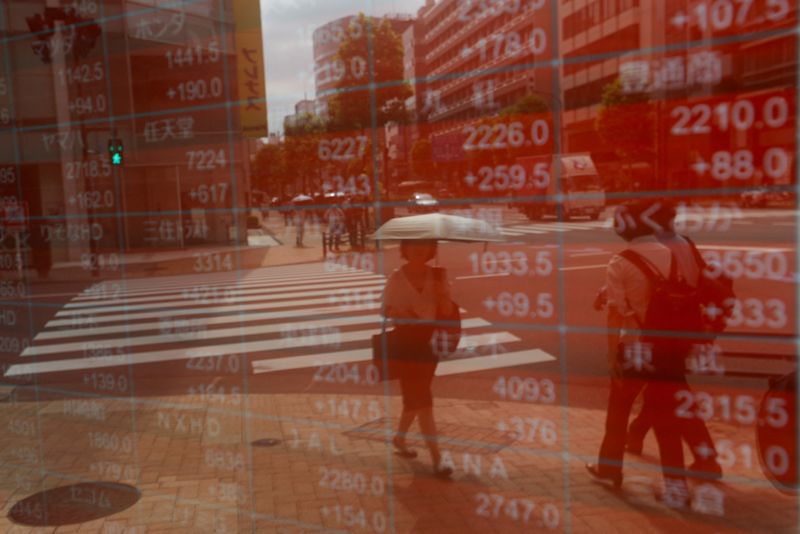Stocks get tech boost, tariff uncertainty weighs on dollar

By Stella Qiu and Koh Gui Qing
SYDNEY/NEW YORK (Reuters) – Global stocks rose on Wednesday as a flurry of new policies from U.S. President Donald Trump combined with robust corporate earnings to bolster investor optimism, while tariff uncertainty kept the dollar near two-week lows.
Netflix (NASDAQ:NFLX) shares surged 14% in after-hours trading as the streaming giant added a record number of subscribers last quarter, enabling it to increase prices for most service plans in the United States and other countries.
That helped lift Nasdaq futures 0.7% in Asia. S&P 500 futures also rose 0.3%. Europe was also set for higher open, with pan-European STOXX 50 futures up 0.2%.
Late on Tuesday, Trump announced that OpenAI, SoftBank (TYO:9984) and Oracle (NYSE:ORCL) will form a joint venture called Stargate and invest up to $500 billion in artificial intelligence infrastructure. Shares of SoftBank surged 11% in Tokyo, while Oracle already gained 7% overnight.
Helping risk sentiment is also relief that Trump did not announce a more comprehensive sweep of tariffs at the start of his second presidency. Many investors and foreign capitals had expected tariffs to be among a raft of executive orders Trump signed in his first day in office.
However, he did talk up the threat of tariffs again on Tuesday, vowing to hit the European Union with fresh levies and saying his administration was discussing imposing a 10% tariff on goods from China on Feb. 1.
“I think we’re pricing out all the extreme moves,” said Hoe Lon Leng, global head of FX flow and EM rates linear trading at Nomura in Singapore.
“I think Trump seems to be more outcome driven. I think he wants to do a good job and … that means the recent oil prices, the recent move higher in bond yields would have affected his position on pushing things to the extreme.”
Japan’s Nikkei jumped 1.6%, tracking broad gains on Wall Street. MSCI’s broadest index of Asia-Pacific shares outside Japan, however, fell 0.1% as drops in Chinese and Hong Kong stocks offset broad gains elsewhere.
Chinese blue chips fell 1% and the Hong Kong’s Hang Seng index lost 1.6%.
The temporary tariff relief has supported a pullback in Treasury yields. The U.S. 10-year Treasury yield, however, edged up 1 basis point in Asia to 4.5866%, having dipped 4 bps overnight.
They were still up around a percentage point since the Federal Reserve started cutting rates in mid-September, reflecting a strong economy and dwindling prospects for large Fed reductions this year.
Futures imply a total easing of 37 bps from the Fed this year, with the first rate cut not fully priced in until July.
The U.S. dollar was a tad stronger but was pinned near a two-week low against its major peers, having finished a choppy session overnight little changed.
The euro eased 0.2% to $1.0412, just off a three-week top of $1.0435, while the Japanese yen also slipped 0.2% to 155.87 per dollar.
Bitcoin held near a record high at $105,694, having rallied 4% overnight as the top U.S. markets regulator created a task force to develop a regulatory framework for crypto assets.
“The road for bitcoin to reach $120,000 is plausible,” said Billy Leung, investment strategist at Global X.
Oil prices were flat, having fallen more than 2% overnight on Trump’s plans to boost U.S. energy production. Brent crude held at $79.35 a barrel, while U.S. crude was little changed at $75.80 a barrel. [O/R]
Gold also resumed its climb to its previous record high. Spot prices rose 0.4% to a 2-1/2 month high of $2,756.19 per ounce, having jumped 1.4% overnight.







